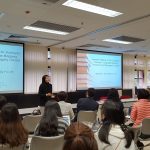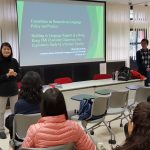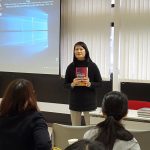Abstract
Paper 1: Building Language Support in an EMI Chemistry Classroom: An Exploratory Study by a Science Teacher
Abstract:
Writing in science plays a crucial part in assessment. However, not many science teachers spend time on cultivating students’ skills in communicating science effectively through English. In this presentation, I share my journey of developing a CLIL (Content and Language Integrated Learning) and LAC (Language Across the Curriculum) approach to the teaching of senior secondary school Chemistry and address the following research questions:
- To what extent is students’ content and language awareness raised by increasing language support?
- To what extent do teachers and students accept the LAC and CLIL approach?
Findings and implications of my exploration study will be discussed.
Paper 2: Thematic Patterns as CLIL Strategies: ‘Concept+Language Mapping’ in Science and Geography Classes
Abstract:
In this presentation, we introduce the ‘Concept+Language Mapping’ method, which we have developed based on Lemke’s theory of thematic patterns to integrate language support into content learning. Preliminary findings from our project schools will be shared showing how students learn both academic content and language and gain confidence in presenting and writing Science and Geography topics using this innovative approach to Content and Language Integrated Learning (CLIL).
Speaker
Mr. Michael Kai Yip TSANG
Yuen Long Merchants Association Secondary School
Professor Angel M. Y. LIN
Head of the Division of English Language Education, HKU
Dr. Emily Peichang HE
Senior Research Associate, Division of English Language Education, HKU
About the Speaker
Mr. Michael Kai Yip TSANG is a former Mathematics and Liberal Studies teacher. He currently teaches Integrated Science, Physics and Chemistry in the Yuen Long Merchants Association Secondary School. He graduated with his Bachelor of Science degree in 2009 and Postgraduate Diploma of Education from the Chinese University of Hong Kong in 2012, and Master of Science in the Hong Kong University of Science and Technology in 2011. In 2016, he finished his Master of Education in Language Across the Curriculum at the University of Hong Kong, and has been developing LAC and CLIL approaches to the teaching of Science.
Dr. Angel Lin is Professor and Head of the Division of English Language Education at the University of Hong Kong (HKU). She is also Director of the Consortium for Research on Language Policy and Practice (CRLPP).
Dr. Emily Peichang HE is Senior Research Associate in the same Division. Both are members of the LAC & CLIL research team at HKU.
Date
14 March 2017 (Tuesday)
Time
12:30 – 2:00pm
Location
Room MW408A-10A, Meng Wah Complex, HKU

- ‘Curses in TESOL’: Postcolonial Desires for Colonial English
- “Enhancing Data-Driven Learning in Disciplinary L2 English Contexts: Introducing CorpusMate”
- “Neither Bilingual nor Education”: critiques of bilingual education in state school education and responses to them
- A Two-Tiered Investigation Into the Dual Goal in EMI Education: Assessment and Instructional Practices
- Acculturation and digital trans-literacies in identity construction: An interdisciplinary perspective (Nov 6th, 2025)
- Appropriation of Resources by Bilingual Students for Self-regulated Learning of Science
- Auckland U – HKU Joint Webinar (28 November, 2024)
- Automated Content Feedback and Young English Learners’ Behaviours, Performances and Response
- Critically Engaged Literacy Workshop as Decolonial and Anti-Racist Pedagogy (April 16th, 2025)
- Crosslinguistic influence in foreign and second language learners
- Developing Language Educators’ Understanding of Assessment Reform Discourse and Practices: School-University Collaborative Action Research as Praxis
- Digital literacy pedagogy:
Key issues in the age of Gen-AI
- Digital Multimodal Composing for Specific Purposes: The Case of Sustainability Discourse
- EMI Symposium 2023: Fostering Collaboration
- Exploring Self-Regulated Use of Artificial Intelligence Tools in Language Learning
- Generative AI: Implications and Applications for Education
- Global Englishes-informed Teacher Education: Present Cases and Future Directions
- HKU-NCL Joint Webinar (Nov 27th, 2025)
- HKU-Newcastle U Joint Webinar: Critical Perspectives on Language Policy and Practice (May 2nd, 2025)
- HKU-NIE Joint Webinar: Designing Learning and Assessment with Multimodality in CLIL Classrooms
- Hong Kong SAR Government’s ‘Biliteracy and Trilingualism’ Policy: Sizing Up and Meeting the Challenge
- Hong Kong Students’ Self-regulated English Writing for Academic Studies
- HUMANISING TECHNOLOGY in Language Learning & Teaching
- Interactional Reflexivity in the Age of AI: Rethinking L2 Writing Teachers’ Assessment Literacy Development (Oct 9th, 2025)
- Language ideologies in text-based art of Xu Bing: Implications for language policy and planning
- Language Learning in 3D Virtual Worlds
- Learning about and using academic vocabulary: Critical issues for pedagogy (Feb 18, 2025)
- Motivational and Empowering Feedback in the Writing Classroom
- Multilingualism and its Ramifications
- Multilingualism and Mobility: The Semiotic Production of Centres and Peripheries in Airport Spaces
- Multilingualism and the Brain
- Narrative Skills in Mandarin- English Dual Language Immersion Learners
- Narratives of Cross-Cultural Understanding among South Asian Diasporic Students in Hong Kong
- NCL-HKU Joint Webinar (June 5th, 2025)
- Newcastle U-HKU Joint Webinar on Cultural Artifact Creation (14 November, 2024)
- Oklahoma U-HKU Joint Webinar (05 December, 2024)
- Optimising Classroom Learning: Speaking in and about Mathematics Classrooms
- People who come from state education are different”: How language use maintains social exclusion in Medical Education
- Policy vs Practice: Homework in Hong Kong EFL Classrooms
- Review of recent research on AI-powered technology in second language teaching, learning and testing (Feb 10, 2025)
- Revival and Threat: Language ideologies, policy, and nationalism in Kazakhstan and Mongolia
- Secondary school students’ source use in inquiry project-based learning (PjBL): Working towards avoiding plagiarism and engaging with sources
- Sociocultural awareness of international ELT policies: The case of a US-funded program in Morocco
- Studies of Public Policy Process and Implications for Research on Education Policy
- The Challenges of Teaching Non-Chinese Speaking Children to Learn Chinese at Kindergarten Level
- The Contributions of Growth Rates in Phonological and Spatial Abilities to Chinese Reading and Mathematical Competencies: A Longitudinal Study of Hong Kong Kindergarteners
- The Digital Literacies Forum 2023
- The Effects of the Medium of Instruction in Physics on Achievement and Motivation to Learn
- The Historical and Linguistic Background of South and Southeast Asian Multi-ethnic Communities in Hong Kong
- The Influence of Extramural Access to Host Culture Social Media on Ethnic Minority Students’ Motivation for Language Learning
- Top desk rejection reasons and how to avoid it
- Translanguaging in Everyday Textual Performances: Implications for Literacy and Pedagogy
- Understanding Language Learning Motivation in Hong Kong
- University of Melbourne – University of Hong Kong Joint Symposium (19 November, 2024)
- Using Reading to Learn Pedagogy to Support Non-Chinese Speaking Students Learning Chinese in Hong Kong
- Videos in language classrooms: A social semiotic perspective
- What can we learn from the Hong Kong Archive of Language Learning Project?
- New technologies in literacy research:
“Measuring” embodiment through
galvanic skin response
- Publishing in top-tier applied
linguistic journals:
Perspectives of an editor�reviewer-author







